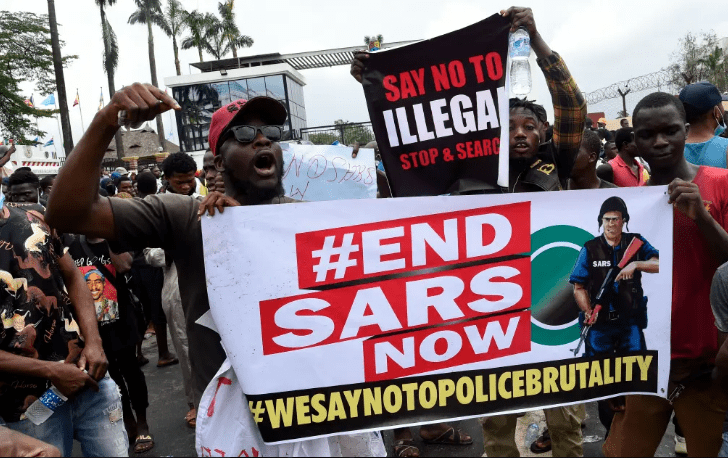
There is no doubt that the chicken has come home to roost. For 13 straight days, Nigerian youths mounted a strong and spirited protest against the activities of the now disbanded Special Anti-Robbery Squad (SARS). The protest which erupted on October 3, while Nigerian leaders were still celebrating the 60 years of Nigeria’s independence, started from the social media as #EndSARS.
The social media protest started after a video of a young man manhandled by SARS operatives at Ughelli, Delta State went viral. From the social media, the protest spread to the streets and engulfed most parts of the country. Major roads in major cities in Lagos, Abuja Port Harcourt, Owerri, Ogbomosho and many others were blocked as hundreds of thousands of youths poured into the streets with placards, paralyzing business and social activities in those places.
Activists, celebrities, Nigerian youths home and abroad were all involved in the protests to demand an end to SARS and police brutality.
The sustenance of the protest for 13 days should be an eye-opener to Nigerian leaders or rulers. There was a level of organization with the people coordinating action on social media remaining largely unidentified. They refused to select leaders or be identified not because they were afraid as they were also part of the street protests, but because they did not want anyone negotiating with the government behind their back.
This is a subtle blow to Nigeria’s labour unions who have acquired a reputation for calling off planned strikes after meeting government officials. From their anonymous and vintage positions, the coordinators were able to pull together everything, from water, food and banners to arranging bail for those arrested. Money was raised through crowd sourcing – some of the donations coming from abroad and some firms in Nigeria whose staff had been easy targets of profiling by SARS and the police in general.
Despite the killings that occurred in some places, as the protest consumed 10 lives, the protest persisted until government succumbed and approved all the demands of the protesters. Deaths were recorded in Lagos, Abuja, Ogbomosho and Owerri. But that did not deter the protesters. Even the dissolution of SARS by the Inspector-General of Police, Muhammed Adamu, could not end the protest. The protesters said they had heard that four times in four years, while SARS continued their brutality and nefarious activities.
Not even President Buhari’s broadcast confirming the disbandment of the police unit and promise of extensive police reforms could make any difference. The youths presented a 5-point demand including the prosecution of the operatives of the department who were at one time or the other involved in killings, robbery and mistreatment of members of the public.
It was after the five-point demand of the EndSARS protesters was accepted and approved by the Presidential Panel on Police Reforms that the protests came to end.
The hard lessons of this protest should not be lost on Nigerian leaders. First, it shows that Nigerian youths can no longer be taken for granted or shoved aside. Second, it shows that Nigerian youths had been bottling their anger against operation and the general state of the nation. It aptly demonstrates that Nigerian youths are deeply dissatisfied with the quality of governance in the country.
The EndSARS protest was only the letting loose of a pent-up anger against the government. Nobody should, therefore, think that the protest was directed only on the proscribed anti-robbery squad. The persistent complaints of youths, civil societies and human rights organizations who had written several petitions to government against the killings and human rights violations by SARS to which the government paid deaf ears over the years, constitute the gun powder that exploded in #EndSARS protest.
All these years, the government had looked the other way while the Special Anti-Robbery Squad established to tackle the menace of armed robbery –as its name suggests –turned the weapons given to them against the citizens while the armed robbers and kidnappers continued to operate freely. None of the criminal operatives involved in killing and robbery of the citizens was prosecuted.
Indeed, the coordination and success of the protest and defiance of the youths against death should also teach our leaders that time has passed when peaceful protests are met with police brutality. That it is no longer the time peaceful protests that is supposed to be part and parcel of democracy should be stopped threats of arrests or death.
The strength of the EndSARS protest was tasted by governor of Rivers State who tried to stop protest in his state with a serious threat but had to come out the next day to meet a mammoth gathering of the youth protesters at the government house in Port Harcourt. He not only took back his threats but had to address them in very friendly terms.
All these indicate that the era of government insensitivity, impunity and bad governance may be gradually coming to an end as the youths of Nigeria cannot be put in perpetual servitude by the old ruling class.
The success of the protest nationwide made possible by celebrities, social media influencers and successful young Nigerians in the diaspora should teach the government the hard lesson that power actually belongs to the people, and should be used for them, not against them. It is an indication that the country’s massive young population has found its voice to demand reforms which cannot be ignored.